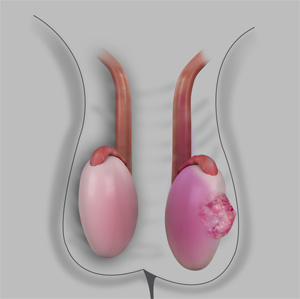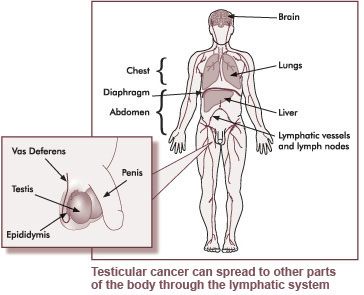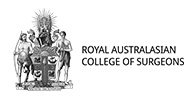
Cancer is a disease that affects the cells that make up the tissues and organs in the body. Cells normally grow and divide in a controlled way, but sometimes, this process gets out of control and the cells continue to divide to form an abnormal growth or lump called a tumour. Tumours can be benign (non-cancerous) or malignant (cancerous).
A benign tumour is not cancerous as the abnormal cells do not normally invade other tissues or spread to other parts of the body. Benign tumours may cause problems to nearby healthy organs by pressing on them and affecting their normal function if they continue to grow.
A malignant tumour is cancerous as cells continue to grow in an uncontrolled way and can invade nearby tissues and spread to other parts of the body through the bloodstream or lymphatic system. If cells reach a new site they may continue to divide and form a secondary tumour (sometimes called a metastasis), if left untreated.
Testicular Cancer
The testes (testis singular: both commonly known as the testicles) are a pair of oval-shaped glands that are suspended in a pouch of skin called the scrotum; next to the penis on the outside of the body. Testicular cancer is a condition where the cells within the testis grow and divide abnormally and a tumour grows in the testis.
A cancer will usually appear as a painless lump in a testis. If medical attention is sought as soon as a lump, swelling or pain in a testis is noticed, this cancer can remain localised (contained within the testis). However, if left unattended, it typically spreads via the blood or lymphatic system to other major organs such as the lungs.
Treatment
All testicular cancers can be treated and if discovered early, and the right treatment given, over 95% of them can be cured. Early detection of testicular cancer can lessen the toxic side effects of the treatments used.
The outlook is positive for those men diagnosed with testicular cancer. Most men go on to live full and active lives.
Treatment may be different depending on the type of testicular cancer and if it has spread to other parts of the body. Treatment for testicular cancer does not normally affect sexuality, masculinity or erectile function. While men who go through chemotherapy or radiotherapy as part of their treatment can become infertile, sperm storage before starting this treatment can usually give them the option of fathering children should their fertility be affected.

Men affected with testicular cancer
Testicular cancer is still one of the rarer forms of cancer with an estimated incidence of approximately 3.8 men in 100,000 men. In Australia in 1997, about 550 new cases of testicular cancer were diagnosed.
Young men are more commonly affected by testicular cancer, with about half of the new diagnoses being made in men under the age of 33 years. Less than one quarter of diagnoses are made in men over 40 years. Testicular cancer is the second most common form of cancer amongst Australian men aged 18 – 39 years.
There has been a steady increase (2% each year) in the number of men diagnosed with testicular cancer in Australia since 1982. This increase has been greater in other western countries- such as England (3.4% each year) and USA (4.3% each year). The reason for this increase is not known.
Despite the increase in the number of new cases, the outlook for men diagnosed with testicular cancer has improved dramatically since the 1970’s when chemotherapy was introduced to treat the disease.
For more information on testis cancer please click here




